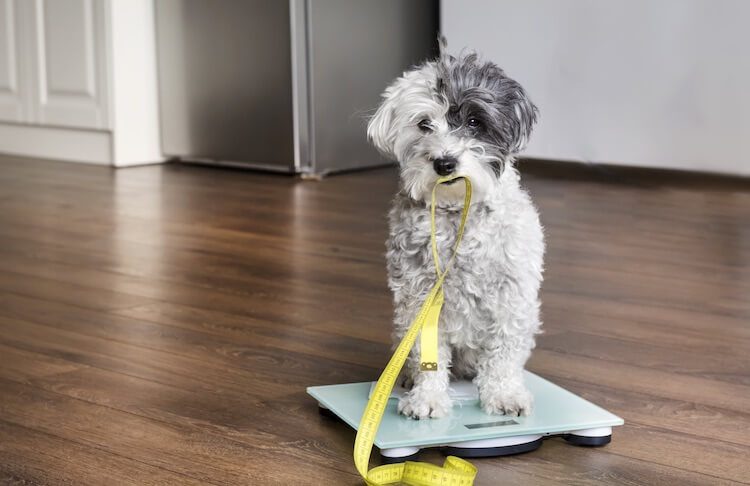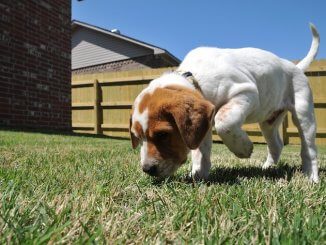It’s one of the questions most asked to vets, trainers, and breeders… “How big will my puppy get?!”
Some people will tell you to look at the size of their paws, however, the best way is to use a puppy weight calculator (jump to our calculator).
Knowing your breed can sometimes make it easier to guesstimate their adult size, however, this becomes increasingly difficult with mix-breeds, that’s why it’s best to use a puppy weight calculator to give you a better idea!
Accurately estimating your puppy’s adult weight is important when it comes to how much to feed a puppy based on their weight, exercising, and planning their crate or space requirements.
Puppy Weight Calculator
Calculate Your Puppy’s Adult Weight
There are some more predictable ways to figure out an estimated adult weight for your puppy, starting with a puppy weight calculator:
Enter your puppy’s age and weight.
Your puppy will weigh between 18lb and 18lb once they are fully grown.
7 Ways to Understand How Big Your Puppy Will Get
From Adobe Stock
7. Start With Their Parents
This is your best chance at figuring out how big your puppy will get, especially if they are a mixed breed.
If you have a German Shepherd puppy, you will know from their breed standard, when fully grown they range from 48 to 90 pounds in weight.
But, if you know Mom weighed 50 pounds, and the Dad 65 pounds, you are more likely to have a small German Shepherd at around 60lb.
6. Litter Size Impacts Puppy Size
Smaller puppies tend to come from larger litters.
So how many siblings your puppy had influences how big a puppy grows in its lifetime.
Litter size varies from breed to breed, but identifying litter trends specific to your chosen puppy could help you understand how big your puppy is likely to get.
5. Are They Male Or Female?
The general rule is, due to sexual dimorphism, females are smaller than males.
If you would prefer a smaller puppy, a female may be better.
For example, female Labradors tend to weigh between 55-70 pounds whereas males are larger weighing between 65-80 pounds.
4. Their Environment & Exercise
Genetics has a large part to play in estimating a puppy’s adult weight, however, the environment will also impact it.
Over-exercise can cause injury and damage to both the skeleton and ligaments of your puppy, which will then require rest.
This is not ideal for a developing puppy as exercise is how puppies increase their bone density.
3. Nutrition!
One of the most important factors in how big your puppy will grow is nutrition.
This starts right from the day they are born.
Their Mom’s milk is made up of protein and fat which is crucial for the growth and development of new-born puppies; a lack of milk can stunt their growth significantly.
During weaning, puppies should have access to quality food as it’s essential to meet their nutritional needs.
If you want your pup to grow to its full potential, then quality food, for their life stage is essential!
2. Breed Type
When your dog reaches their full size will depend on what breed they are.
Medium, large and giant breed puppies can take anywhere between 12-24 months to be fully grown.
Small and toy breeds are fully grown at around 12 months.
It is generally thought that for small breeds a 5oz gain per week is acceptable and for large breeds around 2lb per week.
1. Desexing A Dog
If you choose to neuter your dog, it will have an impact on how big your puppy will get.
It is thought that with the removal of the hormones, the bones don’t receive the message they need to stop growing, so puppies can grow taller.
The concern is then the impact on how the joints align and the subsequent development of orthopedic tissues; desexing should always be considered on a case-by-case basis in discussion with your veterinarian.
Summary
From Adobe Stock
The bottom line, your puppy is a puppy.
Providing you are meeting their daily nutritional needs, they will grow.
Just remember, different puppy breeds will grow at different speeds throughout different growth phases.
Attend regular checks with your veterinarian and mention any concerns about their growth should they appear, you can also keep using our puppy weight calculator to monitor their growth over time!







Our collie is 26 pounds at 15 weeks old!
I’ve had 4, that’s a huge collie! My largest was 82 lbs.
My 15 week german shepherd is 50#. Female. Curious as to what her adult size will be
I have a 1/2 Great Pyr and 1/2 Standard Poodle. She is 16 weeks old and 34lb.
I have a pyr x lab mix weighing 33lb at 17wks! Can’t wait to see what he will weigh.
I have a female Labrottie and she is only 31.2 at 22 weeks
My Pitador is just 7.5lb at 10 weeks – I think she’s gonna be little.
I have catahoula/great pyr who is 18 weeks and weights 52 pounds. He is the biggest of his litter
I have a Pyrenees/Pit mix. At 5 months he weighs 52 pounds.
I have a pomsky weights 21.8 pounds at 5months. I would like to ask for how much he weights at full grown.
Great Pyrenees and Newfie… 32 lbs at 12 weeks. He’s going to be a big boy!
Got a Australian Shepherd. She is a beautiful red merle. Naturally bobbed tail, 1 blue and one green eye. She is gonna be tiny. Not that I care how big she gets, but wanted a dog to protect my family while I’m on the road. She is 22.5 lbs at 16 weeks. Probably will be no larger than 38-40lbs at adulthood. I guess that’s fine though. She is the most protective dog I’ve ever had, by far.
We have an Aussie – Black Lab with a little Golden and Staffordshire in there. At 7 weeks, 8.7 pounds. At 11 weeks, she is 15 pounds. Could get up to 80 pounds.
I have a mastiff mix (Argentinian Dogo, South African Mastiff, Kane Corso, Great Dane). At 13 weeks, he is 45+lbs!! Can’t wait to see him fully grown.
I have two puppies from the same litter, German Shepard/Australian -Golden mix. They are 78lb at 28 weeks!!!
I have a male Golden Retriever and Labrador Retriever mix. His mother is a golden and is 85 lbs and his father is a lab and is 60 lbs. My puppy was 25lbs at 13 weeks!
I have a 23 week old pup. He weighs 36 pounds and is a staffie x King Charles spaniel.
I have a border collie puppy that is almost 14 weeks and already 26lb. He isn’t even overweight. Puppy calculators put him at anywhere from 62-101lb as an adult. Border Collies are only supposed to get up to around 45 lbs. I’m curious, how large is the biggest Border Collie?
Bundry is a 19 week sheepadoodle and is 45 pounds.
Bernedoodle 32 weeks 80 lbs, when he was 8 weeks old he was 26 lb.
All these 15 to 20 pound puppies on here! I have a puppy that was 2.1 pounds at 12 weeks. She is up to a whole whopping 3.5 pounds now at 22-23 weeks. She’s a Biewer (so I chose a Yorkie in the calculator). It has done a great job of predicting her weight pattern this whole time!
No idea what our pup is, but we do know mom looked like an Australian cattle dog mix and was medium sized. Our pup and one other sibling looked completely different than the rest of the litter and were much smaller. She’s 4 lbs at 14 weeks!
We have two Great Pyrenees from the same litter. Both male. At 25 weeks, one weighs 85.2 pounds and the other is at 98.2 pounds. I think they are going to be huge.
I have a 7-week old puppy, he weights 1.49kg, can you tell me in is how much he will weigh full grown. his dad is jack Russel, his mom is Yorkie and Shih Tzu.
Pekingese male puppy 19 week & big is this normal